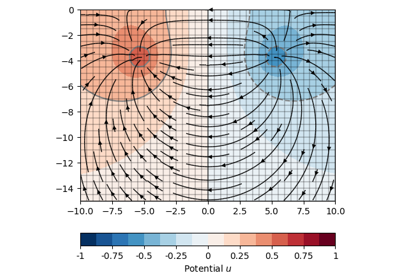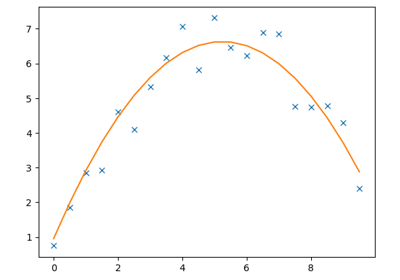pygimli.math#
Math functions and matrices.
Overview#
Functions
|
C++ signature : |
|
Caluculate modified Bessel function of the first kind See Abramowitz: Handbook of math. |
|
Caluculate modified Bessel function of the first kind See Abramowitz: Handbook of math. |
|
Caluculate modified Bessel function of the second kind See Abramowitz: Handbook of math. |
|
Caluculate modified Bessel function of the second kind See Abramowitz: Handbook of math. |
|
C++ signature : |
|
C++ signature : |
|
Globally cached helper function to create Cm05Matrix. |
|
Return determinant for Matrix A. |
|
C++ signature : |
|
C++ signature : |
|
C++ signature : |
|
C++ signature : |
|
C++ signature : |
|
C++ signature : |
|
Compute log-mean (log-weighted mean) value of distribution. |
|
C++ signature : |
|
C++ signature : |
|
C++ signature : |
|
Power function. |
|
C++ signature : |
|
C++ signature : |
|
C++ signature : |
|
C++ signature : |
|
C++ signature : |
|
C++ signature : |
|
C++ signature : |
|
C++ signature : |
|
C++ signature : |
|
Templates argue with python bindings |
|
Symmetric bi-logarithmic transformation (as used in matplotlib). |
|
Inverse symlog transformation. |
|
C++ signature : |
|
C++ signature : |
Functions#
- pygimli.math.angle((object)p1, (object)p2, (object)p3) object :#
- C++ signature :
double angle(GIMLI::Pos,GIMLI::Pos,GIMLI::Pos)
angle( (object)z) -> object :
- C++ signature :
GIMLI::Vector<double> angle(GIMLI::Vector<std::complex<double> >)
angle( (object)b, (object)a) -> object :
- C++ signature :
GIMLI::Vector<double> angle(GIMLI::Vector<double>,GIMLI::Vector<double>)
- pygimli.math.besselI0((object)x) object :#
Caluculate modified Bessel function of the first kind See Abramowitz: Handbook of math. functions; DLLEXPORT double besselI0(double x);
- C++ signature :
double besselI0(double)
- pygimli.math.besselI1((object)x) object :#
Caluculate modified Bessel function of the first kind See Abramowitz: Handbook of math. functions DLLEXPORT double besselI1(double x);
- C++ signature :
double besselI1(double)
- pygimli.math.besselK0((object)x) object :#
Caluculate modified Bessel function of the second kind See Abramowitz: Handbook of math. functions DLLEXPORT double besselK0(double x);
- C++ signature :
double besselK0(double)
Examples using pygimli.math.besselK0
- pygimli.math.besselK1((object)x) object :#
Caluculate modified Bessel function of the second kind See Abramowitz: Handbook of math. functions DLLEXPORT double besselK1(double x);
- C++ signature :
double besselK1(double)
Examples using pygimli.math.besselK1
- pygimli.math.cos((object)a) object :#
- C++ signature :
GIMLI::Vector<double> cos(GIMLI::Vector<double>)
- pygimli.math.cot((object)a) object :#
- C++ signature :
GIMLI::Vector<double> cot(GIMLI::Vector<double>)
cot( (object)a) -> object :
- C++ signature :
double cot(double)
- pygimli.math.createCm05(*args, **kwargs)#
Globally cached helper function to create Cm05Matrix.
- pygimli.math.det((object)A) object :#
Return determinant for Matrix A. This function is a stub. Only Matrix dimensions of 2 and 3 are considered.
- C++ signature :
double det(GIMLI::Matrix3<double>)
- det( (object)A) -> object :
Return determinant for Matrix A. This function is a stub. Only Matrix dimensions of 2 and 3 are considered.
- C++ signature :
double det(GIMLI::Matrix3<double>)
- det( (object)A) -> object :
Return determinant for Matrix A. This function is a stub. Only Matrix dimensions of 2 and 3 are considered.
- C++ signature :
double det(GIMLI::Matrix<double>)
- pygimli.math.dot((object)A, (object)B, (object)c, (object)ret) object :#
- C++ signature :
void* dot(GIMLI::ElementMatrix<double>,GIMLI::ElementMatrix<double>,double,GIMLI::ElementMatrix<double> {lvalue})
dot( (object)A, (object)B, (object)c, (object)ret) -> object :
- C++ signature :
void* dot(GIMLI::ElementMatrix<double>,GIMLI::ElementMatrix<double>,GIMLI::Pos,GIMLI::ElementMatrix<double> {lvalue})
dot( (object)A, (object)B, (object)c, (object)ret) -> object :
- C++ signature :
void* dot(GIMLI::ElementMatrix<double>,GIMLI::ElementMatrix<double>,GIMLI::Matrix<double>,GIMLI::ElementMatrix<double> {lvalue})
dot( (object)A, (object)B, (object)c, (object)ret) -> object :
- C++ signature :
void* dot(GIMLI::ElementMatrix<double>,GIMLI::ElementMatrix<double>,GIMLI::FEAFunction,GIMLI::ElementMatrix<double> {lvalue})
dot( (object)A, (object)B, (object)c) -> object :
- C++ signature :
GIMLI::ElementMatrix<double> dot(GIMLI::ElementMatrix<double>,GIMLI::ElementMatrix<double>,double)
dot( (object)A, (object)B, (object)c) -> object :
- C++ signature :
GIMLI::ElementMatrix<double> dot(GIMLI::ElementMatrix<double>,GIMLI::ElementMatrix<double>,GIMLI::Pos)
dot( (object)A, (object)B, (object)c) -> object :
- C++ signature :
GIMLI::ElementMatrix<double> dot(GIMLI::ElementMatrix<double>,GIMLI::ElementMatrix<double>,GIMLI::Matrix<double>)
dot( (object)A, (object)B [, (object)c]) -> object :
- C++ signature :
GIMLI::ElementMatrix<double> dot(GIMLI::ElementMatrix<double>,GIMLI::ElementMatrix<double> [,GIMLI::FEAFunction])
dot( (object)A, (object)B, (object)ret) -> object :
- C++ signature :
void* dot(GIMLI::ElementMatrix<double>,GIMLI::ElementMatrix<double>,GIMLI::ElementMatrix<double> {lvalue})
dot( (object)v1, (object)v2) -> object :
- C++ signature :
double dot(GIMLI::Vector<double>,GIMLI::Vector<double>)
- pygimli.math.exp((object)a) object :#
- C++ signature :
GIMLI::Vector<double> exp(GIMLI::Vector<double>)
- pygimli.math.exp10((object)a) object :#
- C++ signature :
GIMLI::Vector<double> exp10(GIMLI::Vector<double>)
exp10( (object)a) -> object :
- C++ signature :
double exp10(double)
- pygimli.math.imag((object)A) object :#
- C++ signature :
GIMLI::SparseMapMatrix<double, unsigned long> imag(GIMLI::SparseMapMatrix<std::complex<double>, unsigned long>)
imag( (object)A) -> object :
- C++ signature :
GIMLI::SparseMatrix<double> imag(GIMLI::SparseMatrix<std::complex<double> >)
imag( (object)cv) -> object :
- C++ signature :
GIMLI::Matrix<double> imag(GIMLI::Matrix<std::complex<double> >)
imag( (object)A) -> object :
- C++ signature :
GIMLI::Matrix<double> imag(GIMLI::Matrix<std::complex<double> >)
imag( (object)cv) -> object :
- C++ signature :
GIMLI::Vector<double> imag(GIMLI::Vector<std::complex<double> >)
- pygimli.math.log((object)a) object :#
- C++ signature :
GIMLI::Vector<double> log(GIMLI::Vector<double>)
log( (object)type, (object)msg) -> object :
- C++ signature :
void* log(GIMLI::LogType,std::__cxx11::basic_string<char, std::char_traits<char>, std::allocator<char> >)
log( (object)type, (object)vs) -> object :
- C++ signature :
void* log(GIMLI::LogType,char const*)
log( (object)type, (object)vs, (object)vs) -> object :
- C++ signature :
void* log(GIMLI::LogType,char const*,char const*)
log( (object)type, (object)vs) -> object :
- C++ signature :
void* log(GIMLI::LogType,std::__cxx11::basic_string<char, std::char_traits<char>, std::allocator<char> >)
- pygimli.math.log10((object)a) object :#
- C++ signature :
GIMLI::Vector<double> log10(GIMLI::Vector<double>)
- pygimli.math.logMean(spec, model, axis=0)[source]#
Compute log-mean (log-weighted mean) value of distribution.
- specarray
abscissa values (spectral axis)
- modelarray|array-2d
matrix of density values
- axisint [0]
axis to sum over
- pygimli.math.max((object)v) object :#
- C++ signature :
int max(std::vector<int, std::allocator<int> >)
max( (object)v) -> object :
- C++ signature :
std::complex<double> max(GIMLI::Vector<std::complex<double> >)
max( (object)v) -> object :
- C++ signature :
unsigned long max(GIMLI::Vector<unsigned long>)
max( (object)v) -> object :
- C++ signature :
double max(GIMLI::Vector<double>)
max( (object)a, (object)b) -> object :
- C++ signature :
unsigned long max(unsigned long,unsigned long)
max( (object)a, (object)b) -> object :
- C++ signature :
int max(int,unsigned long)
- pygimli.math.median((object)a) object :#
- C++ signature :
double median(GIMLI::Vector<double>)
- pygimli.math.min((object)v) object :#
- C++ signature :
std::complex<double> min(GIMLI::Vector<std::complex<double> >)
min( (object)v) -> object :
- C++ signature :
double min(GIMLI::Vector<double>)
min( (object)a, (object)b) -> object :
- C++ signature :
unsigned long min(unsigned long,unsigned long)
- pygimli.math.pow(v, p)[source]#
Power function.
pow(v, int) is misinterpreted as pow(v, rvec(int)), so we need to fix this
Examples using pygimli.math.pow
- pygimli.math.rand((object)vec[, (object)min=0.0[, (object)max=1.0]]) object :#
- C++ signature :
void* rand(GIMLI::Vector<double> {lvalue} [,double=0.0 [,double=1.0]])
- pygimli.math.randn((object)vec) object :#
- C++ signature :
void* randn(GIMLI::Vector<double> {lvalue})
- randn( (object)n) -> object :
Create a array of len n with normal distributed randomized values.
- C++ signature :
GIMLI::Vector<double> randn(unsigned long)
- pygimli.math.real((object)A) object :#
- C++ signature :
GIMLI::SparseMapMatrix<double, unsigned long> real(GIMLI::SparseMapMatrix<std::complex<double>, unsigned long>)
real( (object)A) -> object :
- C++ signature :
GIMLI::SparseMatrix<double> real(GIMLI::SparseMatrix<std::complex<double> >)
real( (object)cv) -> object :
- C++ signature :
GIMLI::Matrix<double> real(GIMLI::Matrix<std::complex<double> >)
real( (object)A) -> object :
- C++ signature :
GIMLI::Matrix<double> real(GIMLI::Matrix<std::complex<double> >)
real( (object)cv) -> object :
- C++ signature :
GIMLI::Vector<double> real(GIMLI::Vector<std::complex<double> >)
- pygimli.math.rms((object)a) object :#
- C++ signature :
double rms(GIMLI::Vector<double>)
rms( (object)a, (object)b) -> object :
- C++ signature :
double rms(GIMLI::Vector<double>,GIMLI::Vector<double>)
- pygimli.math.round((object)v, (object)tol) object :#
- C++ signature :
GIMLI::Vector<double> round(GIMLI::Vector<double>,double)
- pygimli.math.rrms((object)a, (object)b) object :#
- C++ signature :
double rrms(GIMLI::Vector<double>,GIMLI::Vector<double>)
- pygimli.math.sign((object)a) object :#
- C++ signature :
GIMLI::Vector<double> sign(GIMLI::Vector<double>)
sign( (object)a) -> object :
- C++ signature :
double sign(double)
- pygimli.math.sin((object)a) object :#
- C++ signature :
GIMLI::Vector<double> sin(GIMLI::Vector<double>)
- pygimli.math.sqrt((object)a) object :#
- C++ signature :
GIMLI::Vector<double> sqrt(GIMLI::Vector<double>)
- pygimli.math.sum((object)c) object :#
Templates argue with python bindings
- C++ signature :
std::complex<double> sum(GIMLI::Vector<std::complex<double> >)
sum( (object)r) -> object :
- C++ signature :
double sum(GIMLI::Vector<double>)
sum( (object)i) -> object :
- C++ signature :
long sum(GIMLI::Vector<long>)
- pygimli.math.symlog(x, tol=1e-12, linearSpread=0)[source]#
Symmetric bi-logarithmic transformation (as used in matplotlib).
Transforms a signed values in a logarithmic way preserving the sign. All absolute values below a certain threshold are treated zero or linearly distributed (if linearSpread>0).
\[f(x) = sign(x) * (log10(1 + abs(x)/tol) + s/2)\]- Parameters:
x (iterable) – array to be transformed
tol (float [None]) – tolerance for minimum values to be treated zero (or linear)
linearSpread (float) – define how wide linear transformation is done (0-not, 1-one decade)
- Returns:
y – transformed array of same size
- Return type:
np.array
See also
- pygimli.math.symlogInv(y, tol=1e-12, linearSpread=0)[source]#
Inverse symlog transformation.
\[f(y) = sign(y) * (10^(abs(y)-s/2) - 1) * tol\]- Parameters:
y (iterable) – array to be transformed
tol (float [None]) – tolerance for minimum values to be treated zero (or linear)
linearSpread (float) – define how wide linear transformation is done (0-not, 1-one decade)
- Returns:
x – transformed array of same size
- Return type:
np.array
See also
- pygimli.math.toComplex((object)re, (object)im) object :#
- C++ signature :
GIMLI::Vector<std::complex<double> > toComplex(GIMLI::Vector<double>,GIMLI::Vector<double>)
toComplex( (object)re [, (object)im=0.0]) -> object :
- C++ signature :
GIMLI::Vector<std::complex<double> > toComplex(GIMLI::Vector<double> [,double=0.0])
toComplex( (object)re, (object)im) -> object :
- C++ signature :
GIMLI::Vector<std::complex<double> > toComplex(double,GIMLI::Vector<double>)
- pygimli.math.unique((object)a) object :#
- C++ signature :
std::vector<long, std::allocator<long> > unique(std::vector<long, std::allocator<long> >)
- unique( (object)a) -> object :
Returning a copy of the vector and replacing all consecutive occurrences of a value by a single instance of that value. e.g. [0 1 1 2 1 1] -> [0 1 2 1]. To remove all double values from the vector use an additionally sorting. e.g. unique(sort(v)) gets you [0 1 2].
- C++ signature :
GIMLI::Vector<double> unique(GIMLI::Vector<double>)
- unique( (object)a) -> object :
Returning a copy of the vector and replacing all consecutive occurrences of a value by a single instance of that value. e.g. [0 1 1 2 1 1] -> [0 1 2 1]. To remove all double values from the vector use an additionally sorting. e.g. unique(sort(v)) gets you [0 1 2].
- C++ signature :
GIMLI::Vector<long> unique(GIMLI::Vector<long>)

